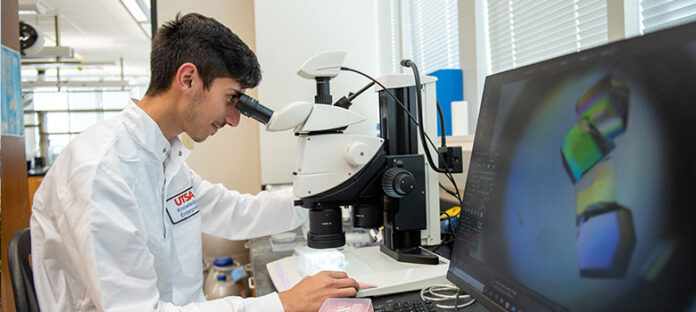## Unlocking the Future of Medicine: UTSA Researchers Awarded Grant to Train the Next Generation of Data Scientists
Imagine a world where diseases are predicted before they strike, treatments are personalized to your unique genetic makeup, and medical breakthroughs happen at an unprecedented pace. This isn’t science fiction, it’s the promise of biomedical data science – a rapidly growing field that’s revolutionizing healthcare.

And right here in San Antonio, UTSA researchers are taking a giant leap forward in this exciting journey. They’ve just been awarded a prestigious NIH grant to expand their biomedical data science education program, paving the way for a new generation of scientists who will shape the future of medicine.

Fueling the Knowledge Economy: UTSA’s Research Momentum
The University of Texas at San Antonio (UTSA) is experiencing a surge in research activity, demonstrating its commitment to driving innovation and contributing to the local and national knowledge economy. This upward trajectory is reflected in several key achievements, signaling a promising future for research at UTSA.
A Record-Breaking Year: UTSA Reaches New Heights in Research Expenditures
In fiscal year 2021, UTSA achieved a record high in research expenditures, reaching $140.0 million. This marks the second consecutive year that UTSA has surpassed the $100 million milestone, a testament to the university’s growing research capacity and the increasing recognition of its contributions to cutting-edge research. These expenditures represent a significant investment in advancing knowledge and tackling complex challenges across a wide range of disciplines.
Seed Grants: Nurturing Innovation Across Disciplines
To further foster research excellence and encourage innovative projects, UTSA’s Office of Research has awarded $380,000 in seed grants to 27 faculty members from various disciplines. These grants, channeled through programs such as the Internal Research Awards (INTRA), the Grants for Research Advancement and Transformation (GREAT), the Transdisciplinary Teams Program (T2), and the Connecting through Research Partnerships Program (Connect), provide crucial seed funding for early-stage research. By supporting these preliminary studies, UTSA empowers faculty to gather essential data and strengthen their proposals for larger, extramural funding opportunities from prestigious organizations like the National Science Foundation, the National Institutes of Health, and the National Endowment for the Humanities.
Building Collaborative Ecosystems: Partnerships Driving Research Advancement
UTSA recognizes the power of collaboration in driving impactful research. The university actively engages in partnerships with industry, government, and other academic institutions to foster a collaborative research ecosystem. These partnerships leverage the diverse expertise and resources of different organizations, accelerating the pace of discovery and innovation. For instance, UTSA’s partnership with the Southwest Research Institute through the Connect program facilitates collaborative research projects that bridge the gap between academia and industry, translating research findings into real-world applications.
NIH Grant: A Boost for Biomedical Data Science Education
UTSA researchers are at the forefront of biomedical data science education, receiving a significant grant from the National Institutes of Health (NIH) to expand educational opportunities in this rapidly growing field. This investment underscores the importance of data science in addressing critical healthcare challenges and highlights UTSA’s commitment to training the next generation of data scientists.
UTSA Researchers Awarded: Spotlight on the Biomedical Data Science Project
UTSA researchers, led by a team of esteemed faculty members, have been awarded a substantial grant from the NIH to develop and implement a comprehensive biomedical data science education program. This project, which aims to bridge the gap between data science and healthcare, will equip students with the necessary skills and knowledge to contribute to the advancement of medical research and improve patient outcomes. The grant will support the development of new courses, workshops, and training programs that integrate data science principles, computational methods, and biomedical domain knowledge.
Expanding Educational Horizons: Implications for the Future of Healthcare
The NIH-funded program will have a profound impact on the future of healthcare by fostering the development of a skilled workforce capable of leveraging data science to address complex medical challenges. By integrating data science into the curriculum, UTSA aims to train a new generation of healthcare professionals who can analyze large datasets, identify patterns and trends, and develop innovative solutions to improve patient care. This interdisciplinary approach will equip graduates with the critical thinking and analytical skills necessary to navigate the evolving landscape of healthcare, where data-driven insights are increasingly crucial for decision-making.
From Data to Discovery: The Potential Impact on Medical Research
The integration of data science into medical research holds immense potential for accelerating discoveries and improving patient outcomes. Biomedical data science enables researchers to analyze vast amounts of clinical data, genomic information, and other relevant datasets to uncover hidden patterns, identify potential drug targets, and develop personalized treatment strategies. The NIH grant will empower UTSA researchers to leverage these data-driven insights to advance medical research and contribute to the development of novel therapies and diagnostic tools.
Shaping the Future: The Growing Importance of Biomedical Data Science
Biomedical data science is rapidly emerging as a transformative force in healthcare, revolutionizing the way we diagnose, treat, and understand diseases. The ability to analyze and interpret vast amounts of biological and clinical data is opening up new avenues for research and innovation, promising to enhance patient care and improve global health outcomes.
Unveiling Insights: How Data Science is Transforming Healthcare
Data science is transforming healthcare by providing powerful tools to analyze complex medical data and uncover hidden patterns. This data-driven approach is leading to breakthroughs in disease diagnosis, treatment development, and personalized medicine. For example, machine learning algorithms can analyze patient records, medical images, and genomic data to identify early signs of disease, predict patient outcomes, and tailor treatment plans to individual needs.
Addressing Complex Challenges: Data Science in the Fight Against Disease
Biomedical data science plays a crucial role in addressing some of the most pressing health challenges facing humanity. From combating infectious diseases to developing cures for chronic illnesses, data-driven insights are accelerating the pace of research and innovation. By analyzing large-scale datasets, researchers can identify potential drug targets, predict the spread of epidemics, and develop more effective vaccines and therapies. The fight against cancer, for instance, is being significantly influenced by data science, with researchers using genomic data to personalize treatment strategies and develop targeted therapies.
Training the Next Generation: The Need for Skilled Data Scientists in Biomedical Fields
The growing importance of biomedical data science is creating a surge in demand for skilled data scientists with expertise in both data science and healthcare. UTSA’s NIH-funded program is responding to this need by providing students with the necessary training to excel in this rapidly evolving field. The program will equip graduates with the technical skills, domain knowledge, and ethical awareness required to make a meaningful contribution to healthcare through data-driven insights.
Conclusion
This NIH grant marks a significant investment in the future of biomedical data science, not just at UTSA, but across the field. By expanding access to education and training, UTSA researchers aim to equip the next generation of scientists with the critical skills needed to unlock the vast potential of big data in healthcare. This initiative has the power to accelerate breakthroughs in disease diagnosis, treatment, and prevention, ultimately leading to improved patient outcomes and a healthier future for all. The implications of this research extend far beyond the walls of the university. As the healthcare industry continues to embrace data-driven approaches, the demand for skilled biomedical data scientists will only continue to grow. By fostering this talent pool, UTSA is playing a vital role in shaping the future of medicine and ensuring that the transformative power of data science is harnessed for the benefit of humanity. This investment in education is an investment in a healthier, more data-driven tomorrow. The questions they answer today will undoubtedly shape the cures and advancements of tomorrow.

